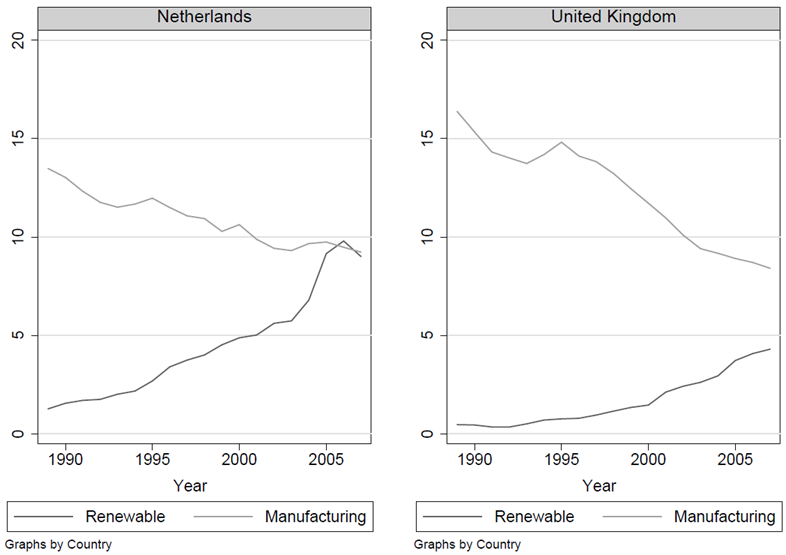 Andrew Cheon and Johannes Urpelainen argue that the supporters of environmental policy should be most influential in the absence of opposition, while the opposition’s importance is maximized when the supporter coalition is strong. They find that empirical studies focusing on a given interest group may overstate or understate its importance unless they take into account the competitive nature of interest group politics.
Andrew Cheon and Johannes Urpelainen argue that the supporters of environmental policy should be most influential in the absence of opposition, while the opposition’s importance is maximized when the supporter coalition is strong. They find that empirical studies focusing on a given interest group may overstate or understate its importance unless they take into account the competitive nature of interest group politics.
With 450,000 people employed and an annual turnover of €45 billion, the renewables producers today are a powerful lobby group. In Europe, the renewables advocacy coalition has played an integral role in shaping national and regional decisions concerning renewables deployment. In addition to the well-known cases of Germany and Denmark, the renewables advocacy coalition flexed its muscles in the adoption of the European climate and energy package in December 2008, a Union-wide legislation mandating that one-fifth of all energy consumption be produced using renewables by the year 2020.
On the other hand, heavy industries have particularly strong incentives to oppose policies that support renewables, because heavy industries’ profitability depends on inexpensive electricity. The EU employer organization, BusinessEurope, emphasized that while industries are “supportive of a general increase in the use of renewable energy … meeting this binding target must not threaten an energy supply at competitive prices.” According to elite interviews conducted by Jorgen Wettestad, heavy industry has been politically active and effective in climate and energy policy, both on the national level – especially in Finland, France, Germany, the Netherlands and the United Kingdom – and vis-á-vis the European Commission.
In our Political Studies article published this year, we argued that the supporters of environmental policy should be most influential in the absence of opposition, while the opposition’s importance is maximized when the supporter coalition is strong. We tested the argument against data on renewable electricity generation in nineteen OECD countries, 1989–2007. We focussed on industrialized democracies because their renewable energy sectors have grown much faster than those in developing countries, and we began in 1989 because prior to that date the price of renewable electricity was too high for most commercial applications.
Using detailed sectoral data on energy-intensive manufacturing industries to measure opposition to policies that promote renewable electricity generation, we found that the growing political clout of renewable electricity producers only maps on to increased future generation if the industry coalition is not too powerful. Similarly, the industry coalition only reduces growth in generation if the renewable electricity producers are powerful enough so that counter-mobilization is necessary in the first place.
Most other control variables exerted only weak influence on outcomes. Neither renewable technology innovation nor the standard economic controls, including international oil prices, had a consistent or substantively large effect on the outcome. Kyoto ratification, EU membership and green party vote share do not appear to have clear effects on renewable electricity generation. An interesting exception is domestic non-renewables energy production. This finding might suggest that domestic energy producers use their political clout to secure subsidies for renewables from the government.
Though we did not find evidence for the independent effect of partisanship on renewable energy growth, analysing split samples suggested that the countervailing effects have occurred under left-wing governments. Left-wing governments seemed to be more sensitive to competitive lobbying in environmental policy than right-wing governments, perhaps due to their greater willingness to expend public resources for environmental purposes.
Our findings shed light on the diverging Dutch and British trends in renewable electricity generation. At the end of the Cold War, both were major gas and oil producers. Neither country was a major generator of nuclear electricity and the economic importance of energy-intensive manufacturing was declining in each of them. Figure 1 shows that while the moderate decline in energy-intensive manufacturing was associated with relatively rapid growth in renewable electricity generation in the Netherlands, the growth was much slower in the United Kingdom, despite a much more dramatic decrease in energy-intensive manufacturing.
Figure 1: Renewable Share of Electricity Generation and Energy-Intensive Manufacturing Share of GDP in the Netherlands and the United Kingdom, 1990–2007
 Courtesy of Political Studies
Courtesy of Political Studies
Sources: Renewable share obtained from the United States Energy Information Administration (EIA) and manufacturing share obtained from the OECD Structural Analysis (STAN) database
Why such variations? Following similar trends in other advanced industrialized countries, the economic importance of heavy industry declined with globalization and changing comparative advantages. While this weakening opens a window of opportunity for policy entrepreneurs in favour of renewable electricity, they cannot exploit it for enduring political gain unless they have already acquired resources for political mobilization. In countries such as the Netherlands or Germany, where a renewables supporter coalition already existed, the consequences of the demise of heavy industry were more salient than in countries such as the United Kingdom or Belgium, where a renewables supporter coalition has emerged only recently.
This idea of countervailing lobbying is not new. Political economists have modeled it in previous theoretical research. Gary Becker (1983) and Nathaniel Keohane et al. (1998) have proposed that the formation of public policies is influenced by the balance of interests. Similarly, David Austen-Smith and John Wright (1992; 1994) examine and test a formal model of “counteractive lobbying.” They find that in some circumstances lobbying by one group is required to trigger lobbying by another group against a proposed policy. However, the key insights from these theoretical studies have rarely been used to examine temporal and cross-national variation in policy formation.
Our findings suggest that empirical studies focusing on a given interest group may overstate or understate its importance unless they take into account the competitive nature of interest group politics. For example, our analysis suggests that if an interest group is likely to be opposed to a given policy, variation in this opposition group’s strength can only explain policy outcomes when the supporters of the policy are strong.
While our findings offer some support to the pluralist view of the policy process (for example, see Dahl (1961) and Truman (1951)), the findings also indicate that competing interest groups have potentially complex counteracting effects on policy. In other words, the effect of interest groups on policy formation is different from the sum of its parts.
Characterizing the relationship between the support coalition and the opponents helps not only to explain actual outcomes, but also to inform regulatory policies. Our results can help policy makers evaluate the degree of political mobilization by supporting and opposing coalitions, and thus gauge how difficult it is to enact a given regulatory policy successfully. Attempts to promote renewable energy without a robust strategy for dealing with political opposition may prove to be futile, even if a nascent advocacy coalition to support them already exists.
Note: This article gives the views of the author, and not the position of the British Politics and Policy blog, nor of the London School of Economics. Please read our comments policy before posting.
About the Authors
Andrew Cheon is a PhD Candidate in Political Science at Columbia University. He studies international politics and political economy of energy, with particular interests in national oil companies, energy security, and renewable energy. His research has appeared in Global Environmental Change and Energy Policy.
 Johannes Urpelainen is Assistant Professor of Political Science at Columbia University. The author of more than 80 refereed articles, his research focuses on environmental and energy policy.
Johannes Urpelainen is Assistant Professor of Political Science at Columbia University. The author of more than 80 refereed articles, his research focuses on environmental and energy policy.








